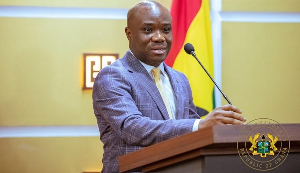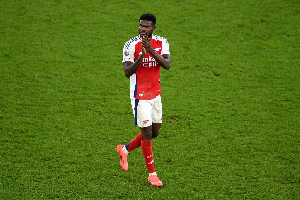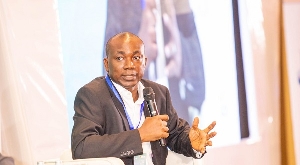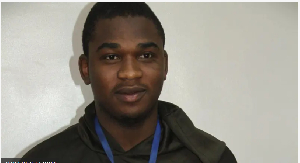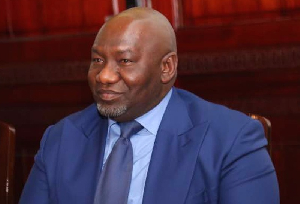A long habit of not thinking a thing wrong gives it a superficial appearance of being right and raises at first a formidable outcry in defense of custom. But the tumult soon subsides. Time makes more converts than reason.
For decades now, many professionals and stakeholders in education have had cause to complain about the copycat curriculum used in basic schools in Ghana. The concerns, seem like the usual daily rants on our media space with little or no attention. The latest global school ranking by the Organisation for Economic Co-operation and Development (OECD) based on test scores in mathematics and science from Fifteen-year-olds in seventy-six nations, however, learns credence to the concerns of these people.
The rankings were based on an amalgamation of international assessments including the OECD’s Pisa tests, the TIMSS test run by the United States-based academics and TERCE tests of Latin America which puts developed and developing countries on a single scale. Out of seventy-six countries on which this test was conducted, Ghana was at the bottom with Singapore topping the list of countries.
An immediate knee jerk reaction was the announcement of a new curricular and a rushed training of teachers and instructors for same. In the usual Ghanaian manner of getting politicians to do the work of technocrats, most of the teacher unions were not consulted.
A curriculum is designed to reflect the aspirations and hopes of a nation. Common sense will tell us, that the power which has endeavoured to subdue us, is of all others, the most improper to defend us. Though there has been several reviews and reforms to the basic education curriculum in Ghana, the Gold Coast Curriculum, the legacy of our colonial masters has outlived its usefulness and must be completely discarded.
Whilst discarding of the old curriculum is long overdue, the quest for a new curriculum however, must not be based on the usual copycat approach where we visit a developed country and copy everything including their culture. It must rather be a meticulous process taking into account our national development agenda, our hopes and aspirations as a nation and most importantly involve all the relevant stakeholders in education. As a man who is attached to a prostitute is unfit to choose or judge of a wife, so is the politician unfit and must be completely removed from the design and implementation of a new curriculum.
Quite recently, there has been debates on the introduction of comprehensive sexuality education into the basic school curriculum in Ghana. In an era where leading countries in education like Singapore and Hong Kong are introducing networking, coding and nanotechnology, Ghana is thinking about comprehensive sexuality education. An absurd and controversial American educational program that has been rejected by many countries. Why do we not learn from the best countries but only from the countries we borrow from? The conversation on the introduction of comprehensive sexuality education in the curriculum has returned again with the Ghana education service calling for stakeholder engagements. Is sexuality our major hope and aspiration for Ghana? Is this our priority? Are the benefits of comprehensive sexuality education more than technological courses like coding and networking that is developing countries like Singapore? Is this not a mere absurdity?
The proponents of this program of course cannot be truthful to the Ghanaian, that is, they have barrowed huge amounts of money from America and as part of the conditions they are required to introduce this program into our education system in Ghana. This is of course the only logical push for an absurd program such as this. From the errors of other nations, let us learn wisdom. The American society today is bedeviled with many ills as a result of absurd programs like the one we are intend to introduce into the curriculum.
According to the United Nations Educational, Scientific and Cultural Organisation (UNESCO), Comprehensive sexuality education is a curriculum-based process of teaching and learning about the cognitive, emotional, physical and social aspects of sexuality. It aims to equip children and young people with knowledge, skills, attitudes and values that will empower them to realize their health, well-being and dignity; develop respectful social and sexual relationships; consider how their choices affect their own well-being and that of others; and understand and ensure the protection of their rights throughout their lives.
UNESCO further outlined some of the advantages of Comprehensive Sexuality Education (CSE) as follows; “Too many young people receive confusing and conflicting information about relationships and sex, as they make the transition from childhood to adulthood. This has led to an increasing demand from young people for reliable information, which prepares them for a safe, productive and fulfilling life. When delivered well, CSE responds to this demand, empowering young people to make informed decisions about relationships and sexuality and navigate a world where gender-based violence, gender inequality, early and unintended pregnancies, HIV and other sexually transmitted infections (STIs) still pose serious risks to their health and well-being. Equally, a lack of high-quality, age- and developmentally-appropriate sexuality and relationship education may leave children and young people vulnerable to harmful sexual behaviours and sexual exploitation. CSE plays a crucial role in addressing the health and well-being of children and young people. Applying a learner-centered approach, CSE not only provides children and young people with age-appropriate and phased education on human rights, gender equality, relationships, reproduction, sexual behaviours risks and prevention of ill health, but also provides an opportunity to present sexuality with a positive approach, emphasizing values such as respect, inclusion, non-discrimination, equality, empathy, responsibility and reciprocity”.
Whilst I admit some of the points raised above are genuine and worth considering, let me say that men are strangely inclined to worship what they do not understand. Below are the counter arguments as provided by Julie Blonigen, Executive Director of Human Life Action Council.
“Public school sex classes ignore individual differences among children and break down the natural modesty of boys and girls. When children are taught academics, such as math and reading, they are given material suitable to their level of readiness for this material. Yet, when it comes to the extremely sensitive area of sexuality, all children in the same grade level are given the same material, even if some are not yet physically or psychologically ready for the material. This is insensitive and harmful. Forcing boys and girls to listen to, view and openly discuss the sexual functioning of the opposite sex anatomy while in their presence is embarrassing and contributes to the breakdown of the modesty that is natural and appropriate in human beings.
What is taught behind the closed doors of the sex education classroom can never be known by parents. Learner out-comes and curriculum objectives do not tell parents the teacher’s words, actions, attitudes, and responses that occur as the sex education lesson is actually taught. This means there is absolutely no way parents can control or even find out what their children are being taught about sex unless they sit in the classroom alongside their children for each and every sex lesson.
Public school sex education has never been shown to reduce teenage pregnancy or abortion. As a matter of fact, a study in the March 2002 issue of the Journal of Health Economics, entitled The Economics of Family Planning on Under age Conceptions, debunks the typical sex-education theory that providing contraceptives to teens will reduce under age conceptions and abortions. Indeed, the study found some evidence that greater access to contraception is associated with an increase in under age conceptions.
The public school has no right to judge the quality of information on sexuality that parents provide their children. Some do a good job, some do a poor job. The school has no right to say they must teach sex because they do not like the job parents do. The school should stay out of the bedroom. Sexuality involves more than plumbing and birth control pills. The school sends the wrong message to students when their sex education courses are mere “how to do it and how not to get caught” lessons. The best lesson in sex, parents can provide their children is the love and respect they show for each other.
When proponents of public school sex education say kids need to know more, what they really mean is they want to teach our kids to use condoms, the pill, and the IUD, and if they fail, where to get an abortion. These people just do not want any more babies. They never talk about reducing fornication or meeting the spiritual needs of our children. They focus on bodies when the real concern is souls.
Children do not need sex education. They need chastity education. Kids need to learn how to say no and why saying no is in their best interest physically, emotionally and spiritually. The biology of sex takes ten minutes to teach, so what are the teachers talking about in a five or ten week course?
There is no such thing as value free sex education. When anything more than the biology is taught, someone’s values are going to be presented. Telling students to “make up your own minds” tells them there are no standards to go by. Telling students it is best to say ‘no’, but if you are going to be sexually active, be protected” sends them the message that the teacher does not really expect them to control themselves. Presenting birth control without saying it is wrong for them to use it tells the students the teacher does not think it is wrong.
Public school sex education attacks and undermines the religious faith of many students. Catholic and Christian students who have been taught by their parents that premarital sex, birth control and abortion are wrong must sit in class and hear an authority figure contradict their beliefs”.
In a nutshell, CSE cannot be our priority at this time in our development. I call on the Ghana education service, as a matter of urgency get rid of the CSE idea as we stand to gain nothing from its introduction.
The author is a political commentator
Email: benonymullray@gmail.com
Opinions of Monday, 3 February 2020
Columnist: Amankwa Benjamin Kwame



